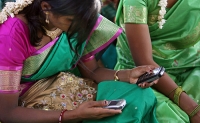The State of Mobiles & Social Media in Public Diplomacy
Principal Investigator:
Anoush Rima Tatevossian
Past Contributing Researcher:
Meredith Deane
“Engagement” is the word of the moment in public diplomacy discourse. One of the widely stated ambitions of “the new public diplomacy,” is to move from monologue to dialogue. Concurrently, web 2.0 has organically given rise to “social media” which is, by its fundamental nature, a culture of sharing and an enabler of two-way engagement and collaboration.
Moreover, there are now 5 billion mobile phone subscriptions worldwide (as compared to 1.8 billion internet users worldwide), and two-thirds of those are people living in the developing world – bringing into connectivity some of the most disconnected populations and communities on earth.
How are mobile phones- the most ubiquitous communications device in human history- being utilized to enhance engagement in international communication and dialogue? How is revolutionary social media being leveraged to improve global understanding? How are two-way communication tools and platforms enabled by new technology, being used for public diplomacy 2.0, and are people’s voices being heard?
This research project seeks to review the landscape, or “The State Of,” mobiles and social media in public diplomacy, through an examination of initiatives conducted by a) Governments, b) International Organizations, and c) Non-State Actors.
The review will look at the goals, results, purpose, effectiveness, limitations and challenges of selected case studies in a way that is both analytic and practical for organizations or institutions looking to implement their own mobile media engagement efforts.
The second phase of research will articulate trends, issues and challenges which arise from the case study review of phase I, and raise awareness of some overarching key concepts from the broader new media and tech community that are relevant to public diplomacy efforts at engagement through social media and mobile. The objective will be to better inform PD 2.0 initiatives by shedding light on these issues.








